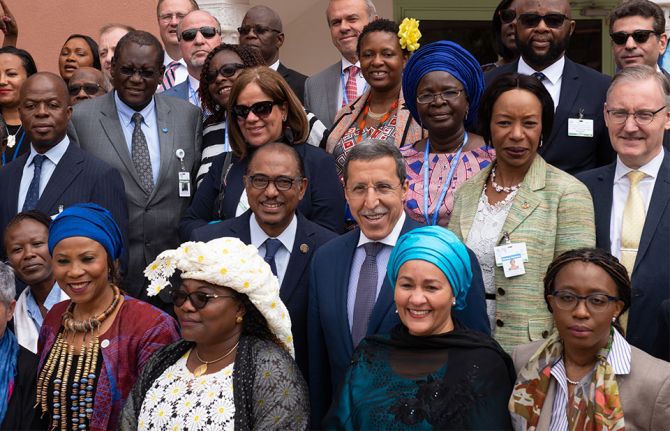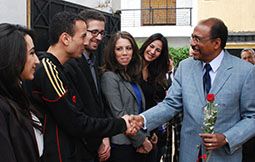

Feature Story
Using sports to combat gender stereotypes and learn about HIV
30 July 2025
30 July 2025 30 July 2025This story first appeared in the UNAIDS Global AIDS Update 2025 report.
Marouane Abouzid grew up in Casablanca, Morocco, where many boys act like bullies and sex is taboo. That changed when he joined the project Sport Is Your Protection, where he gained knowledge about gender equality and health. “The training on HIV awareness led by UNAIDS and Tibu Africa was a transformative experience in the sense that I saw how sports can be an effective way to get a message out,” the 25-year-old says. “It also gave me essential skills like communicating clearly and active listening.”
He enjoyed the project so much that he trained to lead sports activities and participate in other sessions. “I talk openly about what I have learned. I encourage my friends to get tested for HIV and encourage people to respect others,” he says, excited about becoming a role model for his peers.
Marouane describes the activities as a safe space to discuss all sorts of issues that young people face in Morocco, such as poverty, unemployment and a patriarchal system.
Marouane is not alone. Assia Ezzahraoui, a participant in the Tibu Africa sports vocational school programme, joined the weeklong sexual education awareness meeting. “The informative sessions gave me new insights into symptoms, prevention methods and available treatments,” she says. Assia feels more secure about how to protect herself and her friends.
Tibu Africa was founded in 2011 and aims to bring the programme across different cities in Morocco. UNAIDS joined with Tibu Africa in 2024. “This first partnership with UNAIDS Morocco mobilized young people around issues to transcend barriers and create opportunities for dialogue and awareness,” says Mohamed Amine Zariat, President of Tibu Africa. “We hope this first step will serve as a springboard for future, even more ambitious initiatives.”
An estimated 24 000 [21 000–26 000] people are living with HIV in Morocco, and nearly 40% of these are women. Although the prevalence of HIV is relatively low in Morocco, vulnerable populations such as sex workers, gay men and other men who have sex with men and people who inject drugs are particularly at risk. Moroccan youth represent more than 30% of the total population, but a quarter of people aged 15–24 years have no job and lack education and training—young women are particularly hard hit.
Houssine El Rhilani, UNAIDS Country Director in Morocco, is aware of this. He believes the collaboration with Tibu Africa combining sport, education and awareness-raising can empower young people. “We were able to reach young people not only with information, but also through experience, providing them with concrete tools to become prevention ambassadors in their own communities,” he says. “We cannot end AIDS without prioritizing future generations.”



